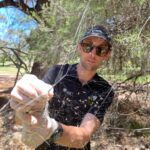Curtin University researchers have determined that current methods used to predict the onset of early dementia are inadequate and should be extended.
Previously, a genetic marker called APOE has been linked to an impairment in thinking skills associated with the development of Alzheimer’s dementia as people get older. General practitioners and other health professionals sometimes test for this marker as a risk factor for dementia.
Lead researcher and Associate Professor in Curtin’s School of Psychology and Speech Pathology, Dr Jonathan Foster, said the research findings demonstrated that this was too simplistic an approach.
“The key finding of our study was that APOE had no significant impact on those thinking skills which are linked to dementia in people who are at risk of developing the disease due to their increasing age,” Dr Foster said.
“Our research indicates that regular monitoring incorporating a full range of clinical tests and other measures undertaken by a multi-disciplinary health team is the best way to determine accurately the likelihood of dementia.
“This finding has significant relevance for people over the age of 60 as well as general practitioners, specialists and other health professionals who are seeking to diagnose dementia, with the prevalence of dementia doubling every five years from the age of 65. This rises to around 40 per cent in those over 90 years of age.
“A holistic approach combining a number of specialities including neuropsychological assessment is recommended. Such an approach means that we are likely able to identify the first signs of Alzheimer’s disease much earlier, so that targeted intervention programs can be recommended for those who are at higher risk of developing dementia.”
In the study, 1112 participants were asked to undertake a range of tests of their thinking skills, as well as providing a small sample of blood so that their genetic status could be determined.
The paper, titled Lack of reliable evidence for a distinctive ε4-related cognitive phenotype that is independent from clinical diagnostic status: Findings from the Australian Imaging, Biomarker and Lifestyle study, will be published on-line by Oxford Journals in ‘Brain’ in early June. This is the number two ranked journal in Neurology and is one of the most highly cited journals in the field today.
This research was supported by the Australian Commonwealth Scientific Industrial Research Organisation (CSIRO), the Science Industry Endowment Fund, the National Health and Medical Research Council and Pfizer.


